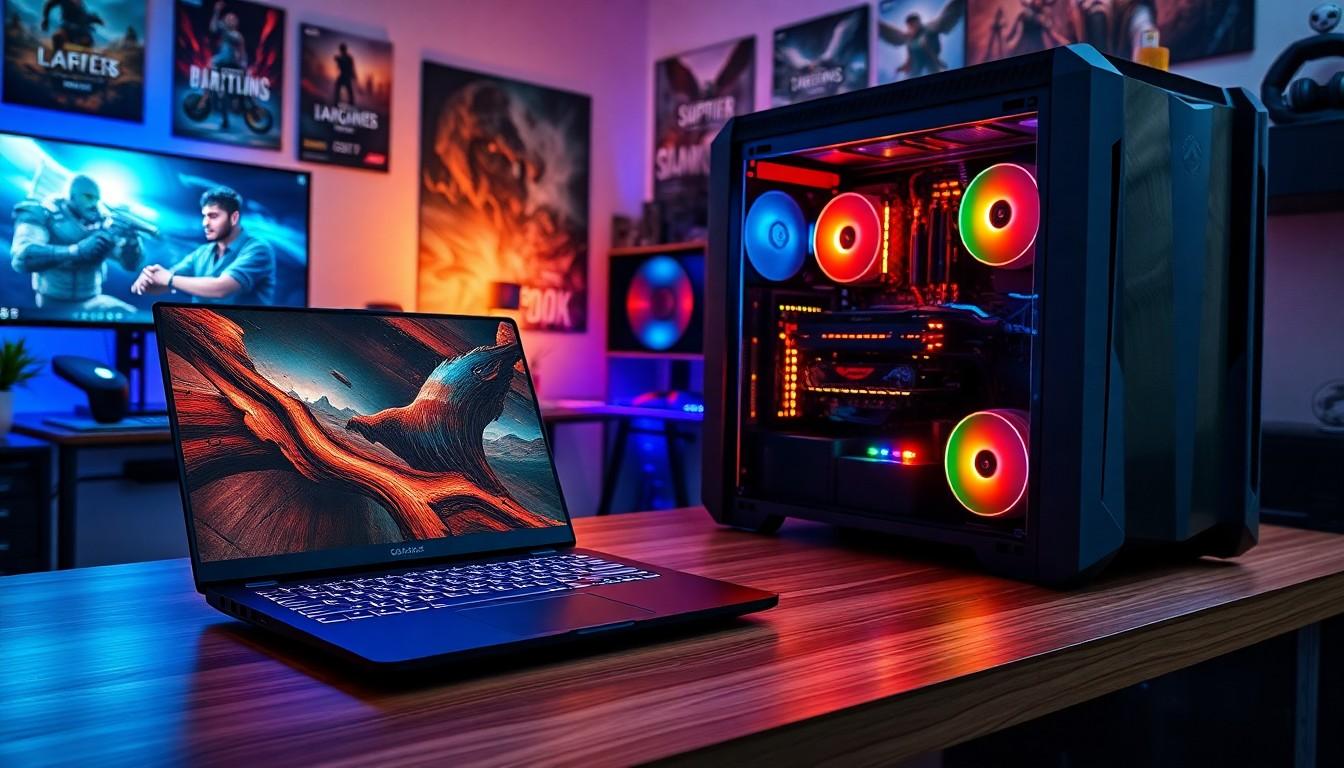Table of Contents
ToggleIn the epic showdown of gaming laptops versus PCs, the stakes couldn’t be higher. Gamers everywhere are torn between the sleek portability of a laptop and the raw power of a desktop. It’s like choosing between a Swiss Army knife and a full-on toolbox—both have their perks, but only one can truly dominate the battlefield.
Overview of Gaming Laptop vs PC
Comparing gaming laptops to desktop PCs reveals key distinctions. Portability characterizes gaming laptops, enabling gamers to play on the go. Convenience accompanies this feature, making them ideal for travel or limited space. Desktop PCs, however, offer superior performance through larger components and better cooling systems.
Gaming laptops tend to have integrated graphics, while desktop PCs often feature dedicated graphics cards. Dedicated cards enhance gaming experiences, delivering higher frame rates and optimal settings. Storage options also differ, with desktops supporting larger drives and faster SSDs. This advantage contributes to quicker load times and extensive game libraries.
Upgradeability stands out as another differentiator. Upgrading components in desktop PCs proves straightforward, enabling gamers to enhance performance over time. Gaming laptops typically provide limited upgrade options, making future-proofing more challenging. Budget considerations also factor in, as gaming laptops often carry a higher price tag for equivalent performance.
Battery life varies significantly between these two options. Gaming laptops depend on battery power, affecting performance during extended sessions without a power source. In contrast, desktop PCs operate directly from a power outlet, ensuring consistent performance.
Preferences shape the choice between gaming laptops and desktop PCs. Portability appeals to some users, while performance and upgradeability attract others. Assessing individual needs ensures the right decision for optimal gaming experiences.
Performance Comparison

Performance varies significantly between gaming laptops and desktop PCs, influencing user choices based on individual gaming needs. Key specifications determine how well each option performs under gaming conditions.
Processing Power
Processing power greatly impacts gaming experiences. Generally, desktop PCs house more powerful CPUs due to larger sizes and better cooling systems. High-end desktop processors, such as the AMD Ryzen series or Intel Core i9, manage demanding tasks more efficiently. Gaming laptops utilize mobile CPUs, which may struggle under heavy loads but prioritize energy efficiency. Users looking for optimal multitasking capabilities often favor desktops.
Graphics Capabilities
Graphics capabilities define the visual quality of gaming. Most desktop PCs come with dedicated graphics cards like NVIDIA GeForce RTX series, offering superior frame rates and graphical settings. Gaming laptops, conversely, often rely on integrated graphics or mobile variants of dedicated cards. These limitations can lead to reduced performance in graphics-intensive scenarios. Players seeking immersive experiences typically find desktops more favorable for high-end gaming demands.
Portability and Design
Portability and design are key factors in evaluating gaming laptops versus desktop PCs. Gaming laptops offer significant advantages in mobility, making them ideal for on-the-go use.
Weight and Size
Weight and size distinctions play a crucial role in portability. Typical gaming laptops weigh between 4 to 8 pounds, accommodating various screen sizes from 15 to 17 inches. They fit easily into backpacks, allowing for convenient travel. In contrast, desktop PCs, including the tower and peripherals, usually weigh over 20 pounds and take up considerable desk space. Given their larger footprint, they restrict mobility, making transport less practical.
Build Quality
Build quality in gaming laptops often emphasizes portability and durability. Manufacturers typically use robust materials like aluminum and reinforced plastics, providing adequate protection during transport. Many gaming laptops possess dedicated cooling systems to prevent overheating despite their compact design. Desktop PCs, however, allow for customized configurations, featuring larger cases that enable better airflow and easier upgrades. Robust cases also enhance cooling efficacy, allowing for powerful components without temperature concerns during intensive gaming sessions.
Cost Analysis
Cost considerations play a significant role when comparing gaming laptops and desktop PCs. Initial investment and long-term value are two primary factors to evaluate.
Initial Investment
Gaming laptops generally have a higher upfront cost. Prices typically range from $800 to over $3,000 depending on specifications. They often include built-in screens, keyboards, and speakers, which may lead to an all-in-one price. On the other hand, desktop PCs can start around $500 and go well beyond $5,000, allowing for tailored configurations according to budget. While desktops might require separate purchases for peripherals, they frequently provide better performance for the price. Selecting either option depends on budget flexibility and personal preferences.
Long-term Value
Long-term value significantly varies between gaming laptops and desktop PCs. Desktop PCs typically offer better upgrade potential, allowing users to replace components over time, extending their lifespan. Investing in a mid-range desk setup can maintain competitiveness for several years. In contrast, gaming laptops often have limited upgrade capabilities and may become outdated faster. Battery replacement may add additional costs, while desktops rely on direct power sources. Users prioritizing sustained performance might find desktops to be a more advantageous long-term investment.
Upgradeability
Upgradeability significantly impacts the longevity and performance of gaming machines. Laptops often present limitations, with most models offering minimal options for upgrades. In contrast, desktop PCs allow for extensive modifications, empowering users to enhance storage, memory, and graphics capabilities easily.
Laptops vs Desktops
Laptops provide convenience and portability, but this comes at the cost of upgradeability. Upgrading components such as RAM or storage in a laptop usually involves technical expertise and often voids warranties. Desktops, on the other hand, feature a modular design, which encourages frequent enhancement. Larger cases accommodate additional hardware, making upgrades straightforward for users looking to boost performance.
Future-Proofing
Future-proofing remains a crucial consideration for gamers looking to invest. Desktop PCs typically support cutting-edge components, potentially extending their operational lifespan significantly. Gaming laptops may quickly become obsolete due to limited upgrade options, restricting performance in new titles. Choosing a desktop allows users to stay relevant in an evolving gaming landscape, ensuring longevity and reliability in performance.
Choosing between a gaming laptop and a desktop PC ultimately comes down to individual priorities. For those who value portability and convenience a gaming laptop might be the best fit. It allows gamers to enjoy their favorite titles on the go without sacrificing too much performance.
On the other hand players seeking superior power and upgradeability will likely lean towards a desktop PC. With its ability to accommodate high-end components and facilitate upgrades it offers a more robust gaming experience.
Understanding personal gaming needs and preferences is key. Whether it’s the allure of travel-friendly gaming or the desire for a powerful home setup each option has its unique advantages that cater to different lifestyles and gaming styles.




